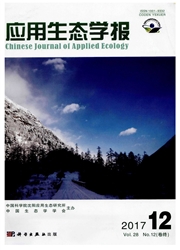

 中文摘要:
中文摘要:
意愿价值评估法(CVM)的评估结果是否具有时间稳定性是其可靠性检验中的重要问题,决定其能否应用于我国的生态系统服务价值评估.本文以上海城市内河生态恢复为评估对象,设计相隔1个月和2年的3次意愿价值评估方案,分别对3次调查的426、498和200份问卷进行了对比分析.结果表明:3次支付意愿均值分别为14.2、14.1和18.0元,中位数分别为5、5和10元.进一步对支付意愿分布和主要统计值、影响因素、模型时间变量的显著性分析结果表明,相隔1个月的CVM结果具有时间上的稳定性,而相隔2年的CVM结果表现出一定差异.
 英文摘要:
英文摘要:
Whether the assessment results of Contingent Valuation Method (CVM) have temporal stability is an important issue in examining the reliability of CVM findings, and also, is critical to decide whether CVM can be applied to evaluate the ecosystem services value in China. Taking the ecological restoration along the Caohejing River in Shanghai as a case, three CVM survey schemes with one month apart and two years apart were designed. Then, 426,498, and 200 questionnaires in these surveys were comparatively analyzed, respectively. The mean values of the willingness to pay (WTP) from the three surveys were 14.2, 14.1, and 18.0 RMB, and the median values were 5, 5, and 10 RMB, respectively. With the comparison of the WTP distribution and the main statis- tics, the analysis of the factors affecting the WTP, and the test of the significances of temporal vari- ables, it was found that the CVM results from the surveys with one month apart had temporal stabili- ty, while those from the surveys with two years apart presented definite difference.
 同期刊论文项目
同期刊论文项目
 同项目期刊论文
同项目期刊论文
 期刊信息
期刊信息
